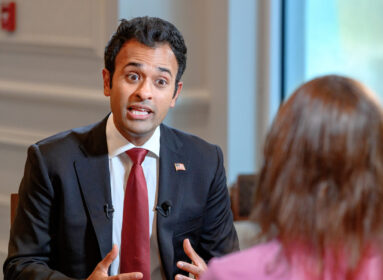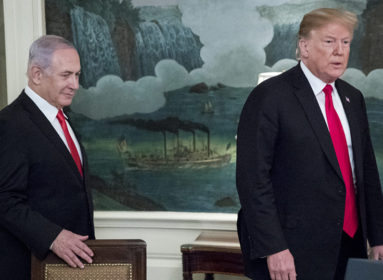
Israeli filmmaker’s short film about a day in the life of a human drone operator will screen at the Tribeca Film Festival (and in Norwalk)
By Cindy Mindell
A single mom works as a human drone operator, killing people on a daily basis in order to make a living. How much of her work does she bring home? This is the theme of Operator, a short film produced in Israel that was selected for the Tribeca Film Festival in April and is making the rounds of Jewish film festivals in the U.S. and UK, including Norwalk on Thursday, Nov. 17.
Directed by Ben Hakim, the film was written by Lior Zalmanson, a post-doctoral associate at New York University researching online user behavior and writing screenplays and plays based on his work. An Israeli native, Zalmanson studied at Tel Aviv University, where he earned an undergraduate degree in computer science, and an MS and PhD from the School of Business Administration in management of technology and information systems. He is founder and curator of Print Screen, Israel’s digital culture and arts festival. Zalmanson was a lecturer in Israel at Tel Aviv University, the Interdisciplinary Center Herzliya, and the Open University. As a researcher, he has won grants and awards from the Fulbright Foundation, Dan David Prize, Google, Marketing Science Institute, Caesarea Rothschild Foundation, and Social Informatics SIG. Prior to his work in New York. His award- and grant-winning writing for stage and screen has been showcased around the world. Zalmanson has written for publications such as Wired UK and MIT Sloan Review, and has served as a lector for the Israeli New Fund for Cinema, among other arts organizations and events in Israel.
Operator is among the five Tribeca Film Festival 2016 short films to be screened on Nov. 17 at the Garden Cinema in Norwalk, followed by a Q&A with Zalmanson.
He spoke with the Ledger about the intersection of technology and humanity that informs his work and his latest screenplay.
Jewish Ledger (JL): How did you come up with the idea for “Operator”?
Lior Zalmanson (LZ): The idea came from an academic conference that I organized, “Robots in Human Society.” One of the speakers, a female law professor, discussed the issue of people who have these desk jobs and are going to be drone operators, operating a robotic flying instrument that has killing abilities but do it remotely. She asked questions about the culpability and about responsibility and that really fascinated me. I’m fascinated in my own research by jobs that were created to some degree by technology but cannot be replaced by technology. So we still need a man in the middle or “a human in the loop,” as it’s called in the modeling and simulation world.
Two years ago, there was a call for screenplays by an Israel science fiction festival. I wanted to submit something but you need to work with a director in order to submit and I knew Ben. Tel Aviv is a small place; I knew his previous work and he was a film student so I knew he needed to submit a final film and I knew I wanted to work with someone who had the ambition to do it fast.I came to Ben with my idea and then with my first draft, which was and remains to this day “a day in the life of a drone operator,” which was, for me, almost about the banality of evil, looking at how this job of a drone operator has you dealing with a lot of ethical questions and very problematic, very nerve-wracking decisions which were once saved only for the battlefield and only for soldiers that are in the state of mind of combat, and now there are desk-job people who kiss their kids good morning and good night every day and after they stop at the gas station and the grocery store, they go and they can bomb people and then they go home. I found that fascinating – the fact that it’s so close to home in a way but so distant and so mediated.
JL: Is there any significance to the fact that you use a woman as the drone operator and not a man?
LZ: The first draft was about a man and it didn’t work out for us. There is a genre of drone-operator films. Between the time we wrote it and the time it got screened in Tribeca, two major films came out: Eye in the Sky with Helen Mirren and Good Kill with Ethan Hawke, and both are dealing with the same sort of dilemmas. Anticipating the release of those films, we wanted to be different and not to focus necessarily on giving an ethical lesson or an in-depth look into the life of a male operator. We wanted to focus more on two things: give the role to a mom because there are many women employed in this role; and we wanted to give an idea of how it feels. I’m really trying to avoid pedagogy, or to put out a film that has a very clear beginning, middle, and end so that film-goers can have some catharsis. Making a short gives you a lot of room to create a fleeting moment, which I hope to achieve.
JL: Was it difficult getting the film produced and shown?
LZ: I was very involved all throughout the making of the film. I tried to not be on the set too much because I feel the screenwriter should not interfere with the director’s work but I was changing the script up until production and even in post-production. Ben and I worked very closely.
Filmmaking is very much a director’s sense of craft or art. It’s Ben’s final BFA film so it was important to me and it was agreed upon that it be his film. Cinema and TV are very different: in a TV series, it’s usually the creator who comes first and has the most influence. But in the filmmaking industry, at least in Israel, the director is very much the auteur and the screenwriter is very helpful but usually comes second or third. I think Ben did a great job and I trust him and I chose him.
Q: How did you get into screenwriting and playwriting?
LZ: I’ve been studying very techie stuff since I was 18 but I always knew I wanted to write. In Israel, it’s basically impossible to have a full-time career as a writer and I was also a very computer-geeky person so I was convinced that I could have a nice-paying job and I found some time and capacity for writing. Usually my writing is about technology, the near future, and social dynamics that originated with the introduction of some high-tech culture or high-tech invention. My play, Users, is currently running in Israel and is about how we started treating people as gadgets and gadgets as people. It’s about 12 relationships between people and their gadgets. Operator is my third screenplay. I wrote two plays for theater and poetry and I have been writing for various mediums. Cinema is always a tough process and it’s tough to combine with my day job as a researcher; that’s why I don’t do it as often as I’d like.
JL: If the film has no obvious Jewish or Israeli content, why is it being picked up by Jewish film festivals?
LZ: When it comes to Israeli films, Jewish film festivals tend to not be so judgmental or searching for what is Jewish about the film. If it is Israeli, it does raise questions of interest to a Jewish population. Leaving the movie aside for a second, I find myself talking to people who are Israeli and asking them about their Jewish identity and I see how it is one for them so they cannot separate Jewish from Israeli anymore.
So I guess a film that depicts a political, contemporary issue happening in Israel is of interest to the Jewish population in the U.S. or elsewhere. However, when I created the screenplay, I didn’t aim for an “Israeli movie;” I actually wanted the film to be almost without any words, not recognizable in terms of the location, and I wanted the average person who has no connection to Israel to think this is everywhere.
It’s not written in a way that should discuss or should be especially related to Israel. It doesn’t necessarily look like Israel, it doesn’t speak about Israel. I actually informed the director in my screenplay notes to not film any footage in recognizable, identifiable sites, and how it should look like anybody’s house. I thought the film would be more effective if people did not attribute the phenomenon of the drone specifically to Israel but look at it as the new future, three years from now, everywhere.
JL: And, generally speaking, has that panned out? That is, do people not connect the use of the drone in the film with Israel?
LZ: There are a few basic things that not all viewers understand about the film: how the theme is generalizable to everywhere, not necessarily just Israel, which is very important because it is set in the near future and doesn’t discuss the Palestinian-Israeli conflict. It’s really about using drones for various reasons. In the film, it’s never clear why and against whom the drone is used. Immediately, we assume that it’s used to protect against enemies outside of our state or in the Israeli-Palestinian conflict. But that is just one very simple explanation and I wanted to keep it vague because a drone can and might be used against various people. I can imagine the drones getting into the hands of not just terrorist groups but crime groups and then they could be very efficient in settling scores, taking revenge against their opponents.
In the film, I put the drone operator not in a military environment but rather in an office environment. It’s very unclear that she or he is working for an army or for national reasons. They’re working to make a living, because this is a job, and this is its price. There is no nationalistic talk in the film at all. But then again, it’s so short that people do come out and say, “This is really a film about the Israeli-Palestinian conflict” or “This is a film about war,” but it’s not. It’s interesting how people retreat into explanations but the film was actually made to open the discussion on who are they shooting, why are they shooting, who will get the rights to use these vehicles in the future.
Short Cuts: Outstanding Short Films from the 2016 Tribeca Film Festival, featuring special guest Lior Zalmanson, screenwriter of Operator: Thursday, Nov. 17, 7 PM, Garden Cinema, 26 Isaac St., Norwalk. For tickets and information: jibproductions.org/shortcuts, (203) 293-8729.







 Southern New England Jewish Ledger
Southern New England Jewish Ledger














